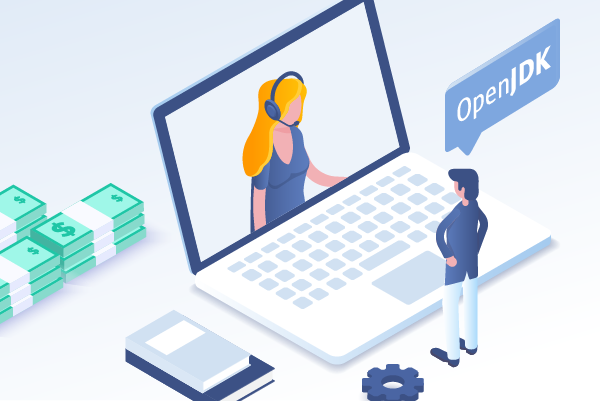About Our OpenJDK Builds
OpenLogic has a long and rich history of OpenJDK community contributions. We believe in and support the open source community development model, and that is reflected in our contributions.
In August 2019, OpenLogic recognized that the current state of Java WebStart technology in OpenJDK was not as capable as the Oracle JDK equivalent. The build was missing critical functionality such as site exceptions, jar key matching, Windows Proxy settings, and other functions. OpenLogic added functionality to IcedTea-Web to bring parity with Oracle’s WebStart distribution. These upgrades were accepted into IcedTea-Web 2.0.
OpenLogic now provides free, quarterly builds of OpenJDK 8, OpenJDK 11, OpenJDK 17, and OpenJDK 21 for Linux, Windows, and MacOS.

Note: Open source OpenJDK is provided free of charge and "as is", without warranty of any kind, express or implied. In no event shall Perforce Software, Inc. or its affiliates be liable for any claim, damages, or other liability arising from out of or in connection with open source OpenJDK software downloaded from this site.
OpenLogic’s OpenJDK Downloads
| JAVA VERSION | OPERATING SYSTEM | ARCHITECTURE | JAVA PACKAGE | DOWNLOAD |
|---|---|---|---|---|
| 25.0.2+10 | Windows | x86 64-bit | JDK | .msi |
| 25.0.2+10 | Windows | x86 64-bit | JDK | .zip |
| 25.0.2+10 | Windows | x86 64-bit | JRE | .zip |
| 25.0.2+10 | Windows | x86 64-bit | JRE | .msi |
| 25.0.2+10 | macOS | x86 64-bit | JDK | .pkg |
| 25.0.2+10 | macOS | x86 64-bit | JDK | .zip |
| 25.0.2+10 | macOS | x86 64-bit | JRE | .pkg |
| 25.0.2+10 | macOS | x86 64-bit | JRE | .zip |
| 25.0.2+10 | Linux | x86 64-bit | JDK | .deb |
| 25.0.2+10 | Linux | x86 64-bit | JDK | .rpm |
| 25.0.2+10 | Linux | x86 64-bit | JDK | .tar.gz |
| 25.0.2+10 | Linux | x86 64-bit | JRE | .deb |
| 25.0.2+10 | Linux | x86 64-bit | JRE | .rpm |
| 25.0.2+10 | Linux | x86 64-bit | JRE | .tar.gz |
| 25.0.1+8 | Windows | x86 64-bit | JDK | .msi |
| 25.0.1+8 | Windows | x86 64-bit | JDK | .zip |
| 25.0.1+8 | Windows | x86 64-bit | JRE | .msi |
| 25.0.1+8 | Windows | x86 64-bit | JRE | .zip |
| 25.0.1+8 | macOS | x86 64-bit | JDK | .zip |
| 25.0.1+8 | macOS | x86 64-bit | JDK | .pkg |
| 25.0.1+8 | macOS | x86 64-bit | JRE | .pkg |
| 25.0.1+8 | macOS | x86 64-bit | JRE | .zip |
| 25.0.1+8 | Linux | x86 64-bit | JDK | .deb |
| 25.0.1+8 | Linux | x86 64-bit | JDK | .rpm |
Get Support For Your Entire Java Stack
In addition to free OpenJDK downloads, OpenLogic also provides SLA-backed technical support and services for many Java distributions, including OpenJDK, OpenJ9, and Oracle Java, as well technologies such as Spring, Tomcat, and Kafka.